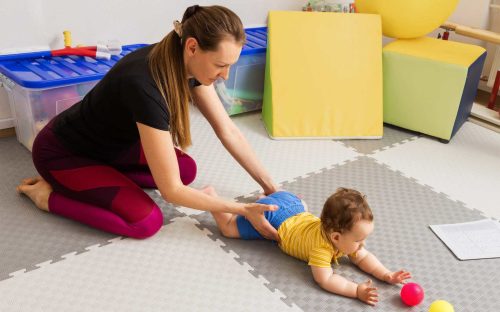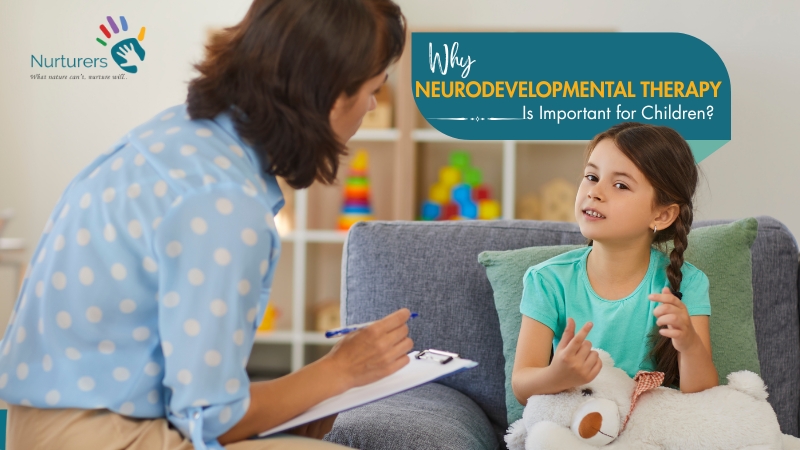Neurodevelopmental Therapy (NDT) is a scientifically designed therapeutic approach that focuses on improving the brain’s ability to control movement and function. It is especially important for children with neurological conditions such as cerebral palsy, developmental delays, Down syndrome, or other motor coordination disorders. The primary goal of NDT is to help children achieve greater independence in their everyday activities by enhancing their posture, muscle tone, balance, and motor skills.
Through specialized hands-on techniques, therapists gently guide and facilitate the child’s movements, helping them learn more efficient and purposeful patterns. This not only supports physical development but also strengthens cognitive, sensory, and emotional growth. NDT sessions are often play-based and interactive, ensuring that therapy feels natural and engaging for children. At centers like Nurturers – the best Neurodiverse Learning Centre in Noida, neurodevelopmental therapy is integrated with sensory and behavioral interventions to provide a holistic approach.
What Is Neurodevelopmental Therapy?
Neurodevelopmental Therapy (NDT) is a specialized, evidence-based therapeutic approach designed to help children who experience difficulties due to disruptions in brain development. It focuses on improving the nervous system’s control over movement, posture, and coordination. The goal is to retrain the brain and body to develop more effective and efficient movement patterns.
Therapists use carefully structured neurodevelopmental techniques such as guided movement, positioning, sensory-motor exercises, and play-based activities. These activities stimulate the child’s neural pathways, enhancing communication between the brain and muscles. Through consistent therapy, children learn how to perform everyday activities like sitting, standing, eating, and writing with better control and confidence.

Understanding Neurodevelopmental Disorders
Neurodevelopmental disorders occur when the brain and nervous system develop differently, affecting how a child moves, communicates, or processes information. These disorders can impact motor skills, attention span, memory, and social abilities. Early identification and therapy can significantly improve long-term outcomes.
Common neurodevelopmental disorders types include:
- Autism Spectrum Disorder (ASD)
- Attention Deficit Hyperactivity Disorder (ADHD)
- Cerebral Palsy
- Intellectual Disability
- Communication and Speech Disorders
- Developmental Coordination Disorder
- Learning Disabilities such as Dyslexia and Dyscalculia
Each of these conditions requires a personalized therapeutic plan tailored to the child’s specific needs.
Is Autism a Neurodevelopmental Disorder?
Yes, autism is a neurodevelopmental disorder that affects social interaction, communication, and behavior. Children with autism may have sensory sensitivities or struggle to understand social cues. At Nurturers, we use neurodevelopmental therapy to address these core challenges through structured play, sensory integration, and movement-based learning.
Our therapists focus on developing a child’s sensory regulation, joint attention, and motor coordination — essential skills that support learning, communication, and emotional well-being.

List of Neurodevelopmental Disorders and Their Symptoms
The list of neurodevelopmental disorders includes several conditions, each presenting differently. However, many share overlapping neurodevelopmental disorders symptoms such as:
- Delay in achieving developmental milestones (e.g., walking, talking)
- Poor coordination or balance
- Low muscle tone or stiffness
- Difficulty in focusing or maintaining attention
- Limited eye contact or social interaction
- Repetitive movements or speech
- Challenges with reading, writing, or problem-solving
Recognizing these signs early can make a tremendous difference. At Nurturers, our team performs detailed assessments to identify the child’s strengths and areas that need intervention.
Does Neurodevelopmental Therapy Work?
Parents often wonder, does neurodevelopmental therapy work? The answer is a strong yes — supported by both research and real-world results. Neurodevelopmental therapy works by leveraging the brain’s ability to rewire itself, a concept known as neuroplasticity. When a child repeatedly practices guided movements and sensory activities, their brain creates new pathways that improve coordination, control, and cognitive responses.
For example, a child with cerebral palsy may learn to maintain better head and trunk control, while a child with autism might show improved sensory tolerance and attention span. These improvements translate into greater independence and confidence in school, play, and social environments.
How Neurodevelopmental Techniques Are Applied?
At Nurturers – the best Neurodiverse Learning Centre in Noida, therapists apply neurodevelopmental techniques through interactive, hands-on sessions. These include:
- Facilitation Techniques: Facilitation techniques involve guiding the child’s body through specific movement patterns to help them understand and replicate correct posture, balance, and coordination.
- Sensory-Motor Activities: Many children with neurodevelopmental disorders have difficulty processing sensory information — they may be hypersensitive or under-responsive to certain sounds, textures, or movements. Sensory-motor activities are designed to address these sensory integration challenges.
- Play-Based Learning: Play is the most natural way children learn. In NDT, play-based learning transforms therapeutic goals into fun, meaningful experiences. Games such as crawling through tunnels, stacking blocks, jumping on trampolines, or playing ball are used to promote coordination, balance, and problem-solving.
- Balance and Coordination Exercises: Balance and coordination are fundamental for all movement — from walking to handwriting. Therapists use exercises such as standing on balance boards, walking on foam beams, catching balls, and rhythmic stepping to improve core stability and bilateral coordination.
- Functional Training: The ultimate goal of neurodevelopmental therapy is to help children achieve independence in everyday life. Functional training focuses on teaching practical skills such as dressing, writing, feeding, brushing teeth, and using school materials effectively.
Every session is designed to target physical, emotional, and cognitive development simultaneously, ensuring holistic progress.
Why Early Intervention Matters
Early childhood is the most crucial stage for brain development. During these years, the brain is highly adaptable, meaning timely intervention through neurodevelopmental therapy can lead to lasting positive changes. The earlier therapy begins, the better the child’s chances of building essential motor and communication skills.
At Nurturers, we emphasize early screening and parent involvement. Our team provides guidance to parents on home-based activities that support therapy outcomes.
The Role of a Neurodiverse Learning Centre in Noida
A Neurodiverse Learning Centre in Noida like Nurturers plays a vital role in bridging the gap between therapy and education. Our environment is designed to nurture both developmental and emotional needs. We collaborate with parents, educators, and therapists to ensure the child’s progress is consistent at home and school.
Our multidisciplinary team includes occupational therapists, speech therapists, behavioral specialists, and special educators — all working together to create a personalized growth plan for every child.
Benefits of Neurodevelopmental Therapy for Children
- Improves Motor Skills: Enhances posture, movement, and coordination.
- Boosts Cognitive Abilities: Strengthens attention, memory, and problem-solving.
- Enhances Social Skills: Promotes interaction, communication, and emotional understanding.
- Encourages Independence: Enables children to perform daily activities more confidently.
- Supports Academic Growth: Improves concentration and fine motor skills necessary for writing and learning.
Through consistent therapy, children not only progress physically but also develop confidence, motivation, and a positive self-image.
Conclusion
Neurodevelopmental Therapy is more than a treatment — it’s a journey toward empowerment. By addressing the root causes of developmental challenges, it helps children build a foundation for lifelong growth and learning. At Nurturers, we provide a compassionate, research-driven approach to support every neurodiverse child’s development. If you’re looking for a trusted Neurodiverse Learning Centre in Noida, reach out to Nurturers and take the first step towards helping your child reach their true potential.

